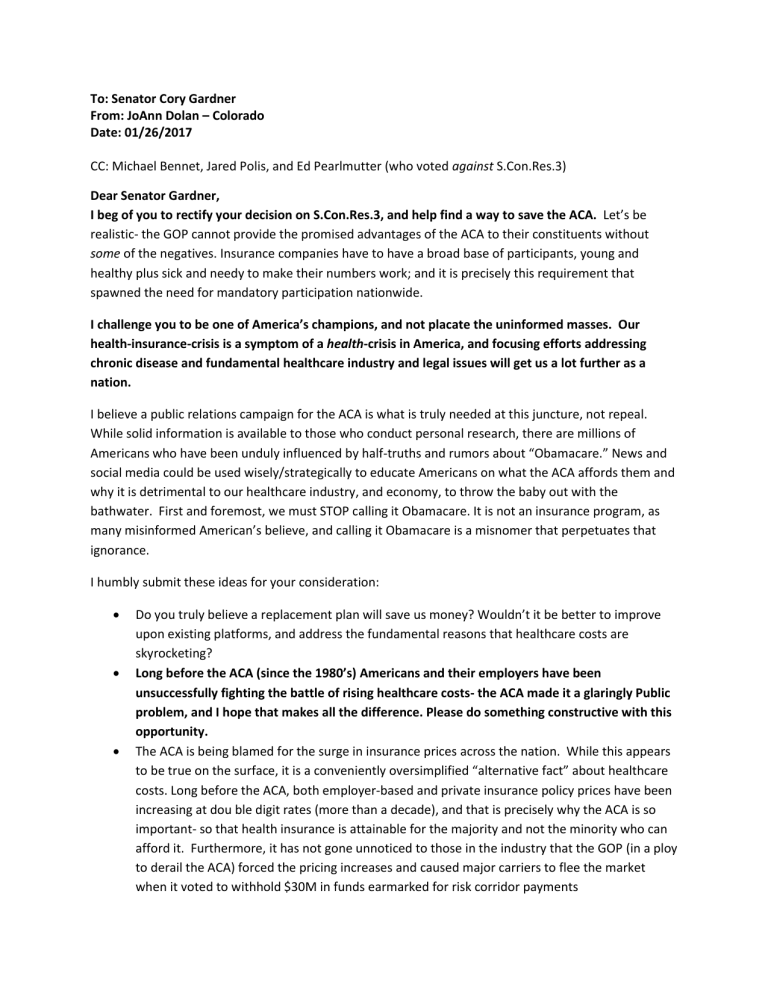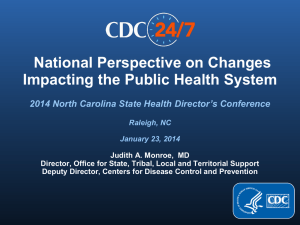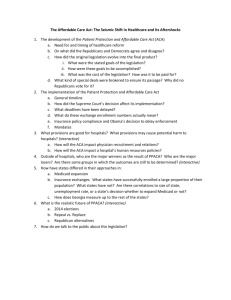
To: Senator Cory Gardner From: JoAnn Dolan – Colorado Date: 01/26/2017 CC: Michael Bennet, Jared Polis, and Ed Pearlmutter (who voted against S.Con.Res.3) Dear Senator Gardner, I beg of you to rectify your decision on S.Con.Res.3, and help find a way to save the ACA. Let’s be realistic- the GOP cannot provide the promised advantages of the ACA to their constituents without some of the negatives. Insurance companies have to have a broad base of participants, young and healthy plus sick and needy to make their numbers work; and it is precisely this requirement that spawned the need for mandatory participation nationwide. I challenge you to be one of America’s champions, and not placate the uninformed masses. Our health-insurance-crisis is a symptom of a health-crisis in America, and focusing efforts addressing chronic disease and fundamental healthcare industry and legal issues will get us a lot further as a nation. I believe a public relations campaign for the ACA is what is truly needed at this juncture, not repeal. While solid information is available to those who conduct personal research, there are millions of Americans who have been unduly influenced by half-truths and rumors about “Obamacare.” News and social media could be used wisely/strategically to educate Americans on what the ACA affords them and why it is detrimental to our healthcare industry, and economy, to throw the baby out with the bathwater. First and foremost, we must STOP calling it Obamacare. It is not an insurance program, as many misinformed American’s believe, and calling it Obamacare is a misnomer that perpetuates that ignorance. I humbly submit these ideas for your consideration: Do you truly believe a replacement plan will save us money? Wouldn’t it be better to improve upon existing platforms, and address the fundamental reasons that healthcare costs are skyrocketing? Long before the ACA (since the 1980’s) Americans and their employers have been unsuccessfully fighting the battle of rising healthcare costs- the ACA made it a glaringly Public problem, and I hope that makes all the difference. Please do something constructive with this opportunity. The ACA is being blamed for the surge in insurance prices across the nation. While this appears to be true on the surface, it is a conveniently oversimplified “alternative fact” about healthcare costs. Long before the ACA, both employer-based and private insurance policy prices have been increasing at dou ble digit rates (more than a decade), and that is precisely why the ACA is so important- so that health insurance is attainable for the majority and not the minority who can afford it. Furthermore, it has not gone unnoticed to those in the industry that the GOP (in a ploy to derail the ACA) forced the pricing increases and caused major carriers to flee the market when it voted to withhold $30M in funds earmarked for risk corridor payments (https://www.nytimes.com/2015/12/10/us/politics/marco-rubio-obamacare-affordable-careact.html). Let’s not make things worse. The ACA is/was an answer to an already broken system, and it makes no sense to go back. Our government should instead be focused on influencing the driving factors for skyrocketing healthcare costs: chronic disease, fee-for-service driven healthcare platforms, unregulated/unwieldy/confusing hospital and pharmaceutical pricing, and malpractice lawsuits. 1. Chronic disease management is complicated and requires a multipronged approach. Efforts in addressing childhood obesity have been successful and will serve us well in future, but for now, providing consistent and affordable preventive care for preexisting conditions helps us to avoid costlier disease management down the road (the ACA helps with that). It will take a while to get to that next level though and we have to stay the course and avoid knee-jerk reactions. From a NY Times article by Robert Pear on 6/9/16: “People with pre-existing conditions are now getting treatment,” said Antoinette Kraus, the director of a statewide consumer group, the Pennsylvania Health Access Network, “and it’s more expensive because they were shut out of the market for many years…” …“But, she added, “we expect that they’ll eventually become healthier, so we won’t see these huge rate increases every year.” Kevin J. Counihan, the chief executive of the federal insurance marketplace, acknowledged that “pent-up demand for health care is greater than people expected and is lasting longer than expected.” 2. We must continue conversations with insurance companies regarding fee-forservice models, which just don’t work. There is growing evidence from existing and successful companies that results-driven payments have better patient outcomes while curtailing costs. Perhaps the government funds a 3rd party study to influence the industry. 3. We must somehow address pricing and unfair insurer payment practices. In all other industries consumers are able to contrast and compare price vs quality, and consumer demand influences prices up/down. In the healthcare industry, costs are less transparent and consumers therefore play little part in controlling industry pricing. Profit-driven insurance companies, healthcare providers and hospitals are running wild with arbitrary pricing. In other industries this sort of pricing practice is considered collusion and is illegal, and we have anticompetitive laws in place to prevent consumer-harming monopolies; yet we have insufficient measures in place for the healthcare industry, something that affects every single person in America at some point in their lives. And despite industry acknowledgement of the unfair practice, patients using in-network hospitals and facilities are still getting lambasted with exorbitant medical bills when portions of their treatment are found (uncontrollably) out of network after-the-fact. This is tantamount to a car manufacturer selling cars to consumers and allowing their parts manufacturers to collect for select parts after purchase; and you would never stand for that. Why then does the GOP seem to take a not-my-job stance with healthcare? I’m particularly confused since this was a Republican-supported matter until about 8 years ago, hmmmm. 4. We must address malpractice lawsuits, perhaps by limiting awards; but more importantly, by finding a better way to distinguish legitimate claims from frivolous claims, and better assign responsibilities to parties involved. Not only do the direct costs of malpractice suits affect industry costs, malpractice avoidance indirectly costs us even more. Extensive and unnecessary tests are routinely performed in an effort to avoid missed diagnosis and as potential lawsuit “evidence” of conscientious and thorough care. The American Journal of Medicine produced an article on this topic in January 2016: http://www.amjmed.com/article/S0002-9343(09)011152/fulltext Some Americans oppose the ACA because they believe it is pushing employers away from providing health insurance to their employees. I actually agree on that point, but I don’t see that as a bad outcome. If we continue to tie health insurance to employers, we as a nation are contributing to the stagnation of our free market economy. People stay with companies far past their expiration date, rather than starting their own businesses or working for smaller companies for fear of losing their health insurance. America needs the lifeblood of small business and innovation, and what we’re left with right now are medium to giant companies beholden to their shareholders, cutting back on employee health and welfare coverage levels, reducing health insurance premium cost sharing, and presenting staggering medical deductibles offset with the tax “blessing” of an HSA to numb the sting. Some Americans miss their old plans because they were more affordable, and believe the higher prices they’re paying haven’t benefited them in any way. What needs to be effectively communicated is that the ACA protects consumers from unwittingly participating in inferior/less expensive plans that could lead to healthcare-related financial crisis or bankruptcy down the road (by striking down annual and lifetime limits, deductibles on preventive care, preexisting exclusions, etc). According to the Consumer Financial Protection Bureau, “Roughly half of all collections tradelines that appear on credit reports are reported by debt collectors seeking to collect on medical bills claimed to be owed to hospitals and other medical providers. These medical debt collections tradelines affect the credit reports of nearly one-fifth of all consumers in the credit reporting system.” (http://files.consumerfinance.gov/f/201412_cfpb_reports_consumer-credit-medical-and-nonmedical-collections.pdf) Some are mad because they consider this a redistribution of wealth, or a socialist program. What needs to be effectively communicated is that the ACA addresses many of the major consumer complaints about health coverage in America without moving to a single payer system, but it only works if everyone participates. We need to target this group with “What’s in it for me” messaging, and that it’s an all or nothing situation to improve upon the issues that concern them personally (like covering dependents, preexisting condition exclusions, medical bankruptcy concerns, etc). Some state that the costs of ACA mandated insurance are contributing to their bankruptcy filings because they cannot afford the coverage. Congress’s support of the “Rubio clause” in 2015 didn’t help their plight, since it pushed major competitors out of the market and drove up pricing. The bigger picture that needs to be painted is that without adequate health insurance, they were already at risk for filing bankruptcy at a future point in time for a medical emergency. Focusing on reducing the cost of healthcare in America is a better way to address their concerns. With health insurance they at least have the opportunity to budget for the costs. The ACA may not have ended medical related bankruptcy but it has certainly made a dent. The Kaiser Family Foundation recently did a survey and found: “… roughly 20 percent of people under 65 with health insurance nonetheless reported having problems paying their medical bills over the last year. By comparison 53 percent of people without health insurance said the same… The financial vulnerabilities reflect the high cost of health care in the United States, the most expensive place in the world to get sick.” Thank you for your time, and I truly hope you reconsider your position on this matter. Half of the country is already upset about the gutting of the ACA, and the other half will eventually be upset when they figure out what’s really going on. Brexit anyone? Sincerely, JoAnn Dolan, Colorado Joann.dolan@yahoo.com 303-810-9924 (Cell)

